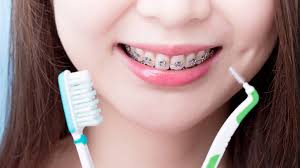
Braces are an essential tool for aligning teeth and achieving a beautiful smile. However, maintaining oral hygiene while wearing best toothbrush for braces can be challenging. Choosing the best toothbrush for braces is crucial to ensure effective cleaning, prevent plaque buildup, and protect your oral health. This guide will help you understand the features to look for in a toothbrush, the different types available, and how to use them for optimal results.
1. Why Oral Hygiene Matters with Braces
Keeping your teeth clean while wearing braces is vital. Food particles and plaque can easily get trapped between the brackets and wires, leading to cavities, gum disease, or discoloration. Additionally, proper brushing helps avoid bad breath and ensures your braces work effectively.
Transitioning to a toothbrush designed for braces makes maintaining oral hygiene significantly easier. Let’s explore the options available to you.
2. Features to Look for in the Best Toothbrush for Braces
Not all toothbrushes are created equal, especially when it comes to braces. Below are the key features to consider:
Soft Bristles: Choose a toothbrush with soft bristles to avoid damaging the brackets or irritating your gums.
Small Head: A compact toothbrush head allows for easier maneuvering around the brackets and wires.
Orthodontic Design: Some toothbrushes are specifically designed for braces and have V-shaped bristles to clean around brackets.
Good Grip: A toothbrush with a sturdy handle ensures better control during brushing.
These features not only make brushing more effective but also more comfortable, especially for those new to braces.
3. Types of Toothbrushes for Braces
There are several types of toothbrushes suitable for braces, and each has unique advantages.
Manual Orthodontic Toothbrushes
Manual orthodontic toothbrushes are a popular choice. These toothbrushes often have a V-shaped design that fits around braces, ensuring thorough cleaning. They are cost-effective, widely available, and easy to use.
Electric Toothbrushes
Electric toothbrushes are another excellent option. With their rotating or vibrating bristles, they can clean hard-to-reach areas more effectively than manual brushes. Many electric toothbrushes also come with pressure sensors to prevent overbrushing.
Interdental Brushes
Interdental brushes are small, thin brushes designed to clean between teeth and under braces wires. They are a great addition to your oral hygiene routine, complementing your regular toothbrush.
Water Flossers with Toothbrush Attachments
Although not traditional toothbrushes, water flossers with brush attachments can be incredibly effective for cleaning around braces. They use water pressure to remove debris and plaque, making them a versatile tool.
4. Top Picks for the Best Toothbrush for Braces
Now that you know the types of toothbrushes available, let’s look at some top-rated options.
1. Oral-B Pro 1000 Electric Toothbrush
This electric toothbrush is a favorite among orthodontic patients. It features a round brush head and oscillating bristles that clean efficiently around brackets.
2. GUM Orthodontic Toothbrush
The GUM Orthodontic Toothbrush is specifically designed for braces, with its V-shaped bristles making it easier to clean around brackets and wires.
3. Platypus Orthodontic Toothbrush
This manual toothbrush offers a unique design tailored for braces. Its ergonomic handle and small head ensure maximum comfort and control.
4. Waterpik Sonic-Fusion 2.0
Combining the benefits of a water flosser and an electric toothbrush, the Waterpik Sonic-Fusion 2.0 is an excellent choice for advanced cleaning.
Transitioning to one of these toothbrushes will make maintaining oral hygiene with braces much simpler.
5. How to Use a Toothbrush with Braces
Even with the best toothbrush for braces, proper technique is essential. Here’s a step-by-step guide:
Rinse Your Mouth: Start by rinsing your mouth with water to remove loose debris.
Apply Fluoride Toothpaste: Use a toothpaste with fluoride to protect your enamel and prevent cavities.
Brush at an Angle: Position your toothbrush at a 45-degree angle to the gum line. Clean above and below the brackets.
Clean Each Tooth: Gently brush each tooth for about 10 seconds, ensuring you cover all surfaces.
Use an Interdental Brush: Clean between your braces and teeth using an interdental brush for added thoroughness.
Rinse Again: After brushing, rinse your mouth thoroughly to remove any remaining toothpaste or debris.
6. Additional Tips for Oral Hygiene with Braces
While choosing the right toothbrush is essential, incorporating the following practices will further enhance your oral care routine:
Floss Daily: Use orthodontic floss or a floss threader to clean between teeth.
Rinse with Mouthwash: A fluoride-based mouthwash helps strengthen enamel and reduce bacteria.
Visit Your Dentist Regularly: Regular checkups ensure your braces are in good condition and your oral health is maintained.
For more information about maintaining oral health during orthodontic treatment, visit The W Dental Group.
7. Why Investing in the Best Toothbrush for Braces Matters
Investing in a quality toothbrush designed for braces is a small step with significant benefits. It prevents costly dental problems, ensures the effectiveness of your braces, and keeps your teeth and gums healthy. Moreover, having the right tools makes your oral hygiene routine quicker and more efficient.
Transitioning to a specialized toothbrush may seem like a minor change, but it can drastically improve your overall experience with braces.
Conclusion
Finding the best toothbrush for braces is essential for maintaining excellent oral hygiene during your orthodontic treatment. Whether you choose a manual, electric, or interdental brush, ensure it meets the unique needs of cleaning around brackets and wires. With proper use of right tools, keeping your teeth healthy and your braces clean becomes much easier.





Leave a Reply